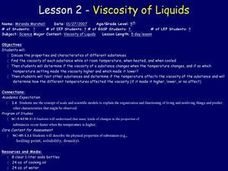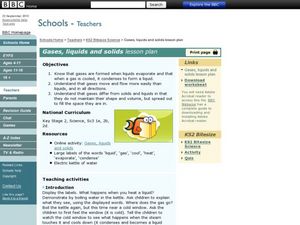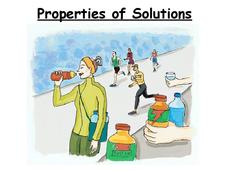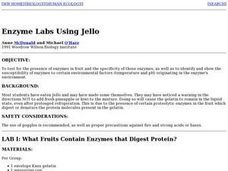Curated OER
The Kelvin Scale
In this Kelvin scale instructional activity, learners read about the relationship between the Celsius scale and the Kelvin scale. They are given the equations to convert from one scale to the other. They find the equivalents for...
Curated OER
Viscosity of Liquids
Fifth graders discuss the properties and characteristics of different substances. They find the viscosity of each substance while at room temperature, when heated and when cooled. They determine if the viscosity of a substance changes...
Curated OER
Selling The Molecular Kinetic Theory
Students investigate molecule movement according to the kinetic molecular theory. In this kinetic molecular theory lesson plan, students observe demonstrations showing that molecules speed up with increasing temperature and slow down...
Curated OER
Change of State
Young scholars investigate the change of states of Butyl Stearate and the temperatures at which it changes state. In this change of state lesson plan, students place a test tube of Butyl Stearate in a cold water bath and monitor its...
Curated OER
Properties of Matter
Students describe four states of matter and their characteristics, explain thermal expansion of matter, interpret state changes in terms of kinetic theory of matter, explain relationship between temperature and volume of a gas, state...
Curated OER
The Energy Debate - Energy of Peanut
Students articulate the difference between the terms heat and temperature. They calculate the amount of energy associated with a given temperature rise and design an experiment to measure the energy of a fuel.
Curated OER
Yeast Experiments
In this science worksheet, students explore two experiments involving yeast. Students discover that yeast grows faster at room temperature than at hot or cold temperatures.
Curated OER
Measuring the Heat Energy of a Chemical Change
Students investigate the Law of Conservation of Energy and the relationship between heat and temperature. In this heat energy and chemical changes lesson, students observe a candle heating a paper cup of water and make predictions about...
Curated OER
Gases, Liquids and Solids, evaporate, shape volume,
Students conduct an online experiment to discover what happens to solids, liquids and gases in different temperatures. In this states of matter lesson, students get into pairs and work in a virtual laboratory to manipulate...
Virginia Department of Education
Heat and Thermal Energy Transfer
How does radiation affect our daily lives? Answer that question and others with a lesson that discusses radiation and its use in thermal energy transfer through electromagnetic waves. Pupils investigate vaporization and...
Science Geek
Properties of Solutions
Study the properties of solutions as they relate to mixtures. The slide show presents the key concepts involved with solutions including solvents, solutes, solubility, and electrolytes. Scholars learn the basics of the properties of...
Curated OER
Heating Curve Lab
Tenth graders examine the heating curve of water when head is added constantly over time. They input values into a calculator as they record water temperature every thirty seconds as it is heated on a hot plate. They complete the...
Curated OER
Ice Ain't Easy
Students are introduced to the laws of thermodynamics. The 1st law of thermodynamics states that the energy must be conserved when two objects of different temperatures come in contact. If one object gains energy, the other object must...
Curated OER
Activity #15 What Happens To A Liquid As Energy Is Added?
Students model the arrangement of particles in a liquid. They use the model, to demonstrate how a gas is formed from a liquid with no increase in temperature as energy is added. Pupils model the arrangement and movement of gas particles.
Curated OER
Some Like It Hot, Some Like It Cold
High schoolers are explained that thermophiles are organisms that have optimal growth temperatures above 50oC. They investigate the temperature ranges for the growth of common bacteria. Students answer the question of do either of these...
Curated OER
Phase Diagram
In this phase diagram worksheet, students use a phase diagram to determine the substance. As the temperature is changes, students figure out the new substance and process that has occurred. This worksheet has 2 problems to solve.
Curated OER
Chemistry First Marking Period Review
In this chemistry review worksheet, students review terms and concepts covered. Students practice metric conversions, factor labeling, temperature conversions, heat calculations, atomic structure, and gas laws. This worksheet has 3...
Curated OER
Chill Out
Students investigate Newton’s Law of Cooling. In this Algebra II/ Pre-Calculus lesson, students explore exponential regression as they conduct an experiment to simulate the temperature variations that occur as a liquid cools. ...
Curated OER
Metric Mania Worksheet
In this metric worksheet, students complete 28 different metric calculations consisting of density, volume, mass, length, temperature, and time.
Curated OER
Evaporation and Condensation
Students explore how temperature affects the processes of evaporation and condensation.
Curated OER
Enzymes and Jell-O
Learners test for the presence of enzymes in fruit and the specificity of those enzymes. They identify the susceptibility of enzymes to certain environmental factors such as temperature and pH in the enzymes environment.
Curated OER
The Great Heat Escape
Students observe a demonstration on the role of thermal conductivity in heat transfer. In this thermal conductivity instructional activity, students design and conduct an experiment to compare the thermal conductivity of four...
Curated OER
Ice Ain't Easy
Students are told that objects in contact with one another reach an equilibrium temperature. A hot object placed in a cool liquid always cool off. It never happens that the object gets hotter and cool liquid gets colder. Students predict...
Curated OER
The Interactive Periodic Table of the Elements
Students study the different types of metals. In this investigative lesson students watch a demonstration on the effects of temperature on atoms and take a tour through baone matter.























